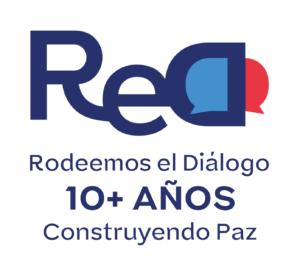Third Conversatorio on the Colombian Peace Process
Third Conversatorio on the Colombian Peace Process
London, 24th October 2013.
This discussion group was the third in a series of five roundtables that aim to analyse the development of each of the rounds of peace talks between the Colombian government and the FARC. Jenny Pearce, Professor of Latin American Politics and Director of the International Centre for Participation Studies, was the guest speaker and Andrei Gomez-Suarez, associate researcher at the University of Oxford, moderated the discussion. About 35 Colombians and foreigners participated in the roundtable.
Contextualization
The 15th round of negotiations began with FARC’s report, which threatened to ‘break the confidentiality’ of the negotiations. Although the information provided was limited to what was already known, it confirmed the tensions between the parties. The 15th round ended in October and showed that the process was very fragile; public opinion was more sceptical than before and it was the first round which came to an end without a joint statement.
The Pause: a national discussion that never got to the table
After noting that the issue of a possible ‘pause’ in the negotiations arose outside Havana and that a sector of civil society, such as Colombians for Peace, reacted positively by suggesting that the pause should be accompanied with a unilateral ceasefire and the delivery by the FARC of maps showing the location of landmines, the audience discussed potential advantages and disadvantages.
Four advantages were identified: a pause could (1) give a second air to the process, (2) enable a balance on what has been achieved to be made, (3) increase civil society involvement, and (4) separate the peace process from electoral politics.
However, three disadvantages came to the fore: (1) the enemies of the peace process will represent the pause as a failure, (2) the process may lose legitimacy in the public eye, and (3) there is a risk of losing the already limited pace that has been achieved in a year of talks.
The conclusion was that the pause in itself is not good or bad, what is important is to determine under what conditions it will take place.
The achievements of the peace process
According to Jenny Pearce, at first reaching an agreement on rural development seemed to be the largest difficulty; however, political participation has proved a major challenge because it has opened the question about the model of political system that Colombians want. This is a profound questioning of power in Colombia. Nonetheless, several achievements were highlighted:
- The agreement on Comprehensive Agrarian Development policy. On the one hand, this point is fundamental to build a country with less social imbalances. On the other hand, it has made it possible to disentangle social protest in rural areas from the actions of guerrilla groups. As a result, the government had to accept the existence of the agrarian problem and negotiate with the peasant leaders.
- The FARC have had to modify their political vision and display a more inclusive politics. Evidence of this is in the launch of the website: http://www.mujerfariana.co/ in which women reclaim their political and revolutionary identity.
These achievements are accompanied by several challenges:
- Unequal political conditions; the FARC does not have spaces in which to discuss their proposals.
- The tension between wanting to open the debate to the public by the FARC and wanting to keep it in Havana by the government.
- The difficulties of dialogue between the urban middle class and the FARC.
- Different interpretations of paramilitary apparatus / Bacrim.
- Criticism by the FARC that the government takes unilateral decisions and by the government that the FARC talks too much.
- Support for the process and President Santos has declined even amongst sectors, such as entrepreneurs, who previously supported the negotiations.
Public Opinion
The government has not developed a strategy to build an informed public opinion. This has enabled enemies of the peace process to take advantage of the idea, common amongst the urban middle class, that most human rights violators are the FARC’s responsibility. As a result, an adverse environment for negotiations has been created.
A new foundation of national identity
Andrei Gomez-Suarez noted the importance of revisiting previous narrow national identity building processes. Participants noted that the current negotiations are an opportunity to create a new foundation of national identity that finally integrates and accepts difference.
The cost of peace
It was discussed that only if hostilities were to end, would Colombia’s GDP grow by 1% (excluding the increase in foreign direct investment and new service markets within the country); however, elites must contribute financially to expand state presence and hence ensure general welfare in Colombia.
Finally, the importance of shielding the process showing the dynamics of social reconstruction that have emerged and the possibilities for economic development was emphasised.
CONVENORS
British Academics for a Colombia Under Peace (BACUP)
Canning House
Plataforma
Rodeemos el Dialogo (ReD)
